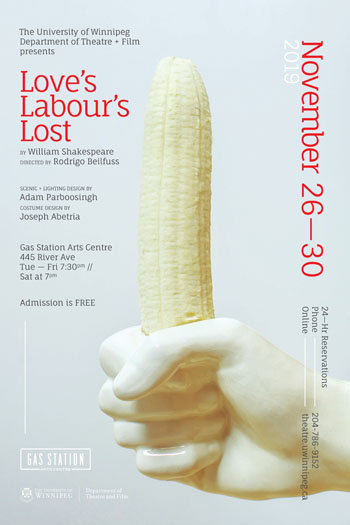LOVE'S LABOUR'S LOST
Order t ickets ONLINE or by calling our Reservations line 204-786-9152.
ickets ONLINE or by calling our Reservations line 204-786-9152.
The University of Winnipeg's Department of Theatre and Film opens its season of public performances with Shakespeare’s unique comedy Love’s Labour’s Lost, directed by Shakespeare in the Ruins' Artistic Director – and graduate of the University of Winnipeg theatre program – Rodrigo Beilfuss. The show runs at the Gas Station Arts Centre from November 26 - 29 at 7:30 pm and November 30 at 7 pm.
Love’s Labour’s Lost is Shakespeare’s most profoundly Elizabethan comedy, replete with witty debates, dazzling wordplay, and strongly drawn comic characters. It is also one of the few plays he wrote in which the plot is entirely original. Written around 1595, it is a highly self-conscious play – it is theatre that knows it’s theatre - at once respecting and undermining the comic form. Many see it as an anticomedy, for it ends not in the usual joy of marriage, but under the most surprising circumstances…
This University of Winnipeg production brings together the graduating Honours Acting class, plus four guests from the program’s first year class. A grand total of 15 actors, playing multiple roles, will inhabit a highly theatrical world of heart-stopping poetry, bombastic music, divine singing and silly dancing.
Word of warning: this stunning play will not be featured in the upcoming ShakespeareFest – indeed, this is your only chance to experience a truly special text that isn’t often performed in the 21st century.
The production is directed by Brazilian-Canadian actor-director Rodrigo Beilfuss, who has spent the last four years at the Stratford Festival and has recently relocated to Winnipeg. It features gorgeously lush lighting and set design by faculty member Adam Parboosingh, whose sleek work was recently seen at the Royal MTC’s acclaimed production of Bang Bang! The majestic, utterly romantic 19th century costumes are by graduate and Stratford alum Joseph Abetria. All technical work is done by both junior and senior production students.
Says Beilfuss: “This young and sweet comedy of affectation reminds us of the last irresponsible summer of our youth, when there was not a care in the world; when even pain could be enjoyed. In the final moments of the play, this illusory freedom of spirit is rudely shattered by the intrusion of Reality – and the characters are forced to face the responsibilities of life, and to embark upon the necessary process of growing up. There will be laughs. There will be tears. And, in the end, there will be transformation…”
